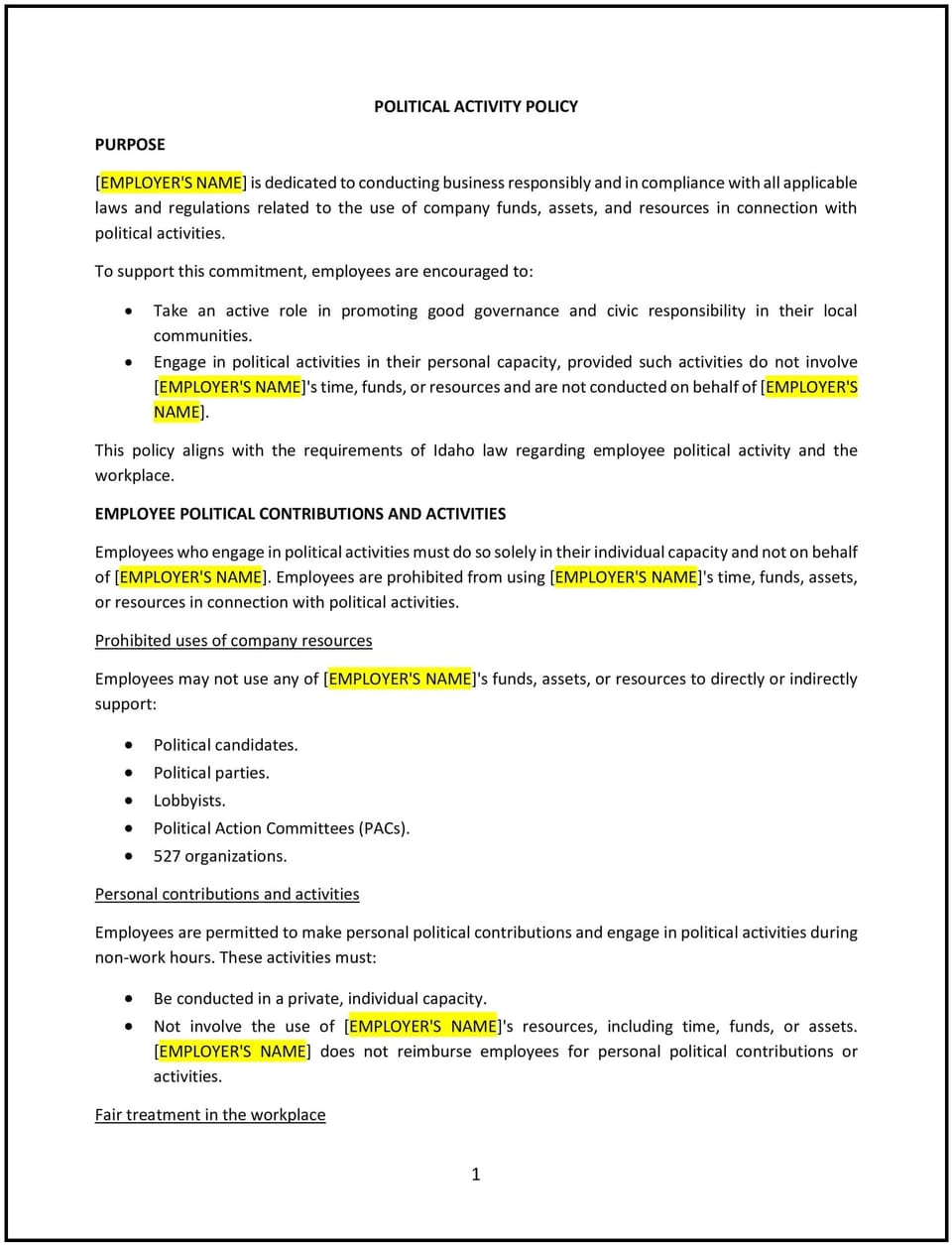Political activity policy (Idaho): Free template

Political activity policy (Idaho)
A political activity policy helps Idaho businesses establish guidelines for employees engaging in political activities, both during and outside of work hours. This policy outlines the business’s stance on political involvement, including restrictions on using company resources for political purposes and guidelines for representing the business in political contexts. It also emphasizes the importance of maintaining a neutral and professional workplace environment.
By implementing this policy, businesses can protect their reputation, ensure compliance with applicable laws, and foster a respectful and inclusive workplace.
How to use this political activity policy (Idaho)
- Define political activities: Specify what constitutes political activities, such as campaigning, fundraising, or lobbying, to ensure clarity and consistency in applying the policy.
- Address work hours and resources: Outline restrictions on engaging in political activities during work hours or using company resources, such as email, equipment, or facilities, for political purposes.
- Set guidelines for representation: Explain how employees should represent the business in political contexts, including avoiding the use of the company’s name or branding without authorization.
- Encourage personal participation: Clarify that employees are free to engage in political activities on their own time, as long as they do not imply the business’s endorsement or interfere with their job responsibilities.
- Train employees: Provide training for employees on the policy, including how to separate personal political activities from their professional roles.
- Review and update the policy: Periodically assess the policy’s effectiveness and make adjustments based on changes in business needs, employee feedback, or Idaho laws.
Benefits of using this political activity policy (Idaho)
This policy offers several advantages for Idaho businesses:
- Protects the business’s reputation: Clear guidelines help prevent the business from being associated with specific political views or activities, maintaining a neutral public image.
- Ensures compliance: The policy helps businesses adhere to Idaho and federal laws regarding political activities, reducing the risk of legal disputes or penalties.
- Promotes professionalism: The policy fosters a professional workplace environment by setting clear expectations for employee behavior.
- Encourages inclusivity: By maintaining neutrality, the policy supports a diverse and inclusive workplace where employees feel respected regardless of their political views.
- Reduces conflicts: Clear guidelines minimize the risk of political disagreements disrupting workplace harmony or productivity.
- Supports employee rights: The policy respects employees’ rights to engage in political activities on their own time while protecting the business’s interests.
Tips for using this political activity policy (Idaho)
- Communicate the policy clearly: Share the policy with employees during onboarding and through internal communication channels to ensure awareness and understanding.
- Train managers: Provide training for managers on how to handle political activity-related issues, maintain neutrality, and enforce the policy consistently.
- Monitor compliance: Regularly review employee activities to ensure adherence to the policy and address any potential issues promptly.
- Stay informed about legal updates: Keep up-to-date with changes to Idaho and federal laws regarding political activities and update the policy as needed.
- Encourage transparency: Foster a culture where employees feel comfortable discussing the policy and reporting potential violations.
- Document everything: Maintain records of policy communications, training sessions, and any actions taken to enforce the policy, ensuring accountability and transparency.
Q: Why should Idaho businesses have a political activity policy?
A: A political activity policy provides clear guidelines for employees engaging in political activities, protecting the business’s reputation and ensuring compliance with applicable laws.
Q: What types of political activities should businesses address in the policy?
A: Businesses should address activities such as campaigning, fundraising, lobbying, and using company resources for political purposes.
Q: Can employees engage in political activities during work hours?
A: Employees should not engage in political activities during work hours or use company resources for political purposes, as outlined in the policy.
Q: How should employees represent the business in political contexts?
A: Employees should avoid using the company’s name or branding in political activities unless explicitly authorized by the business.
Q: What steps should businesses take to maintain neutrality?
A: Businesses should avoid endorsing political candidates or parties, maintain a neutral stance in public communications, and enforce the policy consistently.
Q: How can businesses support employees’ rights to political participation?
A: Businesses should clarify that employees are free to engage in political activities on their own time, as long as they do not imply the business’s endorsement or interfere with their job responsibilities.
Q: How often should businesses review their political activity policy?
A: Businesses should review the policy annually or as needed to ensure it aligns with current business needs, employee feedback, or Idaho laws.
This article contains general legal information and does not contain legal advice. Cobrief is not a law firm or a substitute for an attorney or law firm. The law is complex and changes often. For legal advice, please ask a lawyer.


